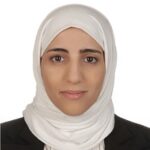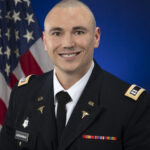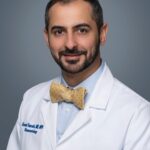Editor’s note: This has been extended from the print version to include additional background information on each recipient.
Each year, the ACR honors up to 10 clinical and research fellows who have performed meritoriously. Meet this year’s Distinguished Fellows, who are bridging the gap between research and patient care, and who were recognized at ACR Convergence 2022 in early November in Philadelphia.
 Fatima Alduraibi, MD, PhD
Fatima Alduraibi, MD, PhD
Instructor, Division of Immunology and Rheumatology, Beth Israel Deaconess Medical Center, Harvard Medical School, Boston
Dr. Alduraibi plans to become a translational physician-scientist. She is interested in understanding the pathogenesis of lupus nephritis and characterizing novel biomarkers. Her work with John Mountz, MD, PhD, at the University of Alabama at Birmingham (UAB) has led to the identification of biomarkers involved in severe lupus nephritis in African Americans. She is also working closely with Jasvinder Singh, MD, MPH, at UAB, to identify distinct phenotype clusters in a single-center clinical cohort in clusters of patients with gout based on comorbidities and biomarkers, which include parameters of inflammatory cytokines and oxidative stress markers.
Also, Dr. Alduraibi is working with Maria Danila, MD, MSc, MSPH, at UAB, in rheumatoid arthritis–interstitial lung disease (ILD) research. Her goal is to establish an ILD registry to improve data extraction to be used for future clinical research projects. As part of her dedication to patient care, Dr. Alduraibi has created a rheumatological disease reference barcode system, which provides educational material for patients on disease conditions and medications, improving patient education.
She is also working on the ferroptosis of keratinocytes in skin lesions in patients with lupus at Harvard Medical Faculty Physicians at Beth Israel Deaconess Medical Center.
“I am honored and thrilled to have been named as one of the ACR Distinguished Fellows. It is a reflection of the outstanding support by exceptional mentors who allowed me to grow as a physician scientist and enabled me to enrich my area of interest in lupus nephritis and become a growing expert in the field,” says Dr. Alduraibi.
 Rebecca B. Blank, MD, PhD
Rebecca B. Blank, MD, PhD
Post-Doctoral Research Fellow/Instructor, Division of Rheumatology, New York University (NYU) Grossman School of Medicine, New York City
Dr. Blank’s long-term interests involve the interplay between the microbiome, systemic immune response and inflammatory disease. Her graduate work included studying the adaptive immune response to Schistosoma mansoni infection with James McKerrow, MD, PhD, at the University of California, San Francisco, and postdoctoral work on the role of regulatory T cells in modulating gut inflammation in the lab of Yasmine Belkaid, PhD, at the National Institutes of Health (NIH), Bethesda, Md. Dr. Blank’s work on regulatory T cells in the gut led to her interest in the gut microbiome and its role in influencing both mucosal and systemic immune responses.
Her current interests are to understand the role of the gut microbiome and its metabolic products, such as short chain fatty acids (SCFA), in inducing a regulatory immune response in new-onset rheumatoid arthritis (RA) patients. She is currently engaged in a pilot proof-of-concept study examining the role of SCFA supplementation in RA patients under the mentorship of Jose U. Scher, MD, at NYU Grossman School of Medicine. Based on the results of her pilot studies, she would like to undertake an investigator-initiated clinical trial and continue her work as a physician-scientist. In addition to her current studies in RA, she is a co-investigator in the NIH-Accelerating Medicines Partnership (AMP) Microbiome Core and New York University site lead on a multicenter, randomized, double-blind, placebo-controlled, preventive trial of guselkumab in high-risk psoriasis patients.
“I am so honored and grateful to receive a Distinguished Fellow Award from the ACR this year. I deeply appreciate all the support from my mentors and patients I have had in my career and especially during my fellowship training at NYU without which I would not have been able to achieve this honor. It is humbling to follow in the footsteps of former ACR Distinguished Fellows, many of whom are current colleagues and mentors!” says Dr. Blank.
 Michael Loncharich, MD
Michael Loncharich, MD
Acting Associate Program Director, Rheumatology Fellowship, Walter Reed National Military Medical Center, Bethesda, Md.; and Assistant Professor, Uniformed Services University of the Health Sciences, Bethesda, Md.
Dr. Loncharich is an active duty service member in the U.S. Army, caring for military members from all branches, their families and veterans. He is leading the launch of a transitional rheumatology program with Olcay Jones, MD, PhD, Walter Reed’s pediatric rheumatologist. Dr. Loncharich has been an active educator at the Uniformed Services University medical school and for the internal medicine residency at Walter Reed. He has led more than 140 hours of didactic training for medical students and residents during his fellowship, and participated in three curriculum development projects.
Dr. Loncharich has ongoing research projects focusing on education and clinical medicine. In education, his primary focus is investigating the role of cognitive biases in clinical reasoning and identifying debiasing methods to reduce physician error. He plans to expand his research on cognitive biases in pursuit of a doctorate in health professions education.
On the clinical side of his research, Dr. Loncharich is leading multidisciplinary studies with internal medicine, pediatric rheumatology and physical medicine and rehabilitation, investigating sympathetic joint effusions, transitional rheumatology needs, and platelet-rich plasma safety and efficacy for patients with rheumatoid arthritis. His prior research on atypical presentations of antisynthetase syndrome and outpatient management and outcomes of multisystem inflammatory syndrome have earned him two top-presenter awards at national conferences.
“I’m honored to receive the ACR’s Distinguished Fellow award. The award validates that my clinical, research and education endeavors are not only interesting to me, but also are seen as beneficial to the broader rheumatology community and our patients. I’ve been lucky to have had amazing mentors at Walter Reed and the National Institutes of Health along the way and hope to help future rheumatology fellows master their clinical skills and pursue their career goals,” says Dr. Loncharich.
 Elizabeth Park, MD, MSc
Elizabeth Park, MD, MSc
Assistant Professor, Division of Rheumatology, Columbia University Irving Medical Center, New York City
Dr. Park’s research has focused on cardiovascular complications of rheumatic diseases in two main areas. First, Dr. Park is identifying features and predictors of subclinical left ventricular remodeling/function in a rheumatoid arthritis (RA) cohort without clinical heart failure (RHYTHM [RHeumatoid arthritis: studY of THe Myocardium]). She published a review article in Arthritis & Rheumatology on this topic, as well as on the evolution of diastolic function in the RHYTHM cohort in Arthritis Research & Therapy. Dr. Park is also establishing biomarkers for RA with clinical heart failure by studying associations between a panel of 60 cytokines and other inflammatory proteins and left ventricular dysfunction, myocardial inflammation and microvascular disease (funded by a Pfizer Investigator Sponsored Research Award).
Second, Dr. Park is interested in defining cardiotoxicity of disease-modifying anti-rheumatic drugs (DMARDs) in autoimmune rheumatic disease patients. Dr. Park has presented on the absence of an association between QTc electrocardiogram intervals and hydroxychloroquine use in a rheumatologic cohort at the 2020 ACR annual meeting and published these findings in Arthritis Research & Therapy.
Combining her previous experience in bioinformatics, knowledge in RA with clinical heart failure and this newfound interest in DMARD toxicity, she is currently working on mass extraction and analysis of the association between hydroxychloroquine use and cardiotoxicity (arrhythmia, myocarditis, heart failure), using a consortium of multi-institutional electronic health records.
“It is a tremendous honor to be recognized for my work as a research and clinical fellow, and I am deeply grateful for our patients and the mentorship I have received thus far,” says Dr. Park.
 Ahmad Ramahi, MD, MPH
Ahmad Ramahi, MD, MPH
Research Fellow, Scleroderma Program, Division of Rheumatology, University of Michigan, Ann Arbor
Dr. Ramahi is particularly interested in scleroderma. He completed one year of clinical research in the scleroderma program at the University of Michigan under the mentorship of Dinesh Khanna, MBBS, MSc. His research focused on the role of lung ultrasound in screening for systemic sclerosis interstitial lung disease compared to high-resolution computerized tomography scan, as well as the role of anti-topoisomerase I antibody in predicting forced vital capacity decline in systemic sclerosis-interstitial lung disease patients.
Dr. Ramahi has also participated in many quality improvement projects during his residency and fellowship, most recently investigating the rate of allopurinol discontinuation and its contribution to gout flares. In addition to ongoing teaching for medical students and residents during his training, he also continued to be active on social media platforms. He is the founder of a group that includes thousands of medical students and residents where they share experience and knowledge (AQU-MED-Experience Sharing). Dr. Ramahi also participated in many community service activities, including targeting adult and childhood obesity in Fulton County, Ohio, and formulating a population-based program to address it during his Masters of Public Health study.
“I am beyond honored to receive the ACR Distinguished Fellow award. This award magnifies the importance of research in rheumatology and fuels my motivation and passion for working in the scleroderma field and serving my community. I am thankful to my mentors in the scleroderma program and the University of Michigan rheumatology division who invested in me, and, without their support, I wouldn’t have achieved this,” says Dr. Ramahi.
 Didem Saygin, MD
Didem Saygin, MD
Assistant Professor of Medicine, Division of Rheumatology and Clinical Immunology, University of Pittsburgh
Dr. Saygin studies the development and improvement of outcome measures in idiopathic inflammatory myopathies with the goal of optimizing the assessment of patients in clinical practice and performance of clinical trials in myositis. Her work demonstrated psychometric properties of several outcome measures including handheld dynamometry, physical activity monitors, task-oriented physical function tests and Patient-Reported Outcomes Measurement Information System (PROMIS) physical function, pain and fatigue forms in myositis.
She is also passionate about fellow education and has led studies to better understand the experiences of rheumatology fellows during the pandemic and the preferences of fellows regarding virtual rheumatology fellowship interviews.
“Being selected as one of the ACR Distinguished Fellows is an honor and testament to my mentors and everyone who supported me along the way. I am also very grateful to the ACR for supporting trainees—at every stage—and rheumatologists across the U.S.,” says Dr. Saygin.
 Melanie H. Smith, MD, PhD
Melanie H. Smith, MD, PhD
Assistant Attending Physician, Division of Rheumatology, Hospital for Special Surgery, New York City; and Assistant Professor of Medicine, Weill Cornell Medical College, New York City
Dr. Smith’s doctoral work in the lab of Jonathan Weissman, PhD, at the University of California, San Francisco concentrated on the recognition and regulation of misfolded proteins within the cellular environment. During her PhD, she became interested in autoimmunity and specialized in rheumatology because of the clinical challenges as well as scientific questions that can arise as a result of a break in self-tolerance.
As a postdoctoral fellow in immunology with a joint appointment in the labs of Laura Donlin, PhD, at the Hospital for Special Surgery and Alexander Rudensky, PhD, at Memorial Sloan Kettering Cancer Center in New York City, Dr. Smith explored the implications of interactions between tissue-resident fibroblasts and infiltrating immune cells in the synovium in rheumatoid arthritis. Her work revealed a central role for location-specific cytokine signaling in determining states of fibroblast activation within the synovium. She is continuing to research how fibroblast activation states are influenced by interactions with infiltrating monocytes and lymphocytes through a career development grant from the Rheumatology Research Foundation.
“It is an incredible honor to receive the ACR Distinguished Fellow award. It is a testament to the opportunities I have had during my fellowship training and the amazing group of mentors that have supported my development as both a physician and a scientist. I am excited to embark on a career dedicated to understanding mechanisms of disease, with the goal of improving care for our patients,” says Dr. Smith.
 Ajay Tambralli, MD
Ajay Tambralli, MD
Assistant Professor, Divisions of Rheumatology and Pediatric Rheumatology, University of Michigan, Ann Arbor
Dr. Tambralli has had a long-standing interest in translational research. As an undergraduate student and a research assistant, he worked in a lab aimed at repairing damaged tissues using various nano-scaled biomaterials. One such material enabled deep cellular infiltration into a scaffold at a level not previously demonstrated and was subsequently patented. As a medical student, he contributed to studies characterizing therapeutic biologic use in pediatric rheumatic diseases, which is often affected by differences in the metabolism of children compared with adults.
He is currently working in the lab of Jason Knight, MD, PhD, at the University of Michigan, where he is striving to understand the role of neutrophil metabolism in the pathogenesis of antiphospholipid syndrome (APS). This has generated the potential concept of manipulating neutrophil metabolism to reduce disease morbidity in APS patients.
Dr. Tambralli has also demonstrated a dedication to teaching throughout his training. He has mentored several high school students, undergraduate students and research technicians in the lab, several of whom have gone on to pursue advanced degrees. While in residency, he helped build a decision aid for patients with rheumatoid arthritis (RA), which was designed to enable a real-time discussion of the efficacy and side effects of RA treatments using an online graphical interface. He then used this as a model and developed a workshop to teach medical students the principles of evidence-based medicine. He continues to mentor trainees in the lab, the clinic and small groups in medical school.
“I am very grateful to be named an ACR Distinguished Fellow. This award attests to the support of the many mentors and colleagues I have worked with over the years, who have molded me into the person I am today. I am thankful to the ACR for this recognition and will continue striving to become a better physician-scientist and a valuable citizen in the rheumatology community,” says Dr. Tambralli.
 D. Sofia Villacis Nunez, MD
D. Sofia Villacis Nunez, MD
Assistant Professor of Pediatrics, Division of Pediatric Rheumatology, Emory University School of Medicine/Children’s Healthcare of Atlanta
During her fellowship, Dr. Villacis Nunez’s interests were diverse. She actively participated in several multidisciplinary scholarly projects with a focus on the influence of infectious agents in the development and treatment of pediatric rheumatic and immune-mediated diseases. One of her biggest projects focused on investigating the optimal treatment strategy of multisystem inflammatory syndrome in children, a condition that afflicted many children and puzzled physicians around the globe during the COVID-19 pandemic. Similarly, she investigated the effects of COVID-19 in pediatric patients with rheumatic diseases, finding interesting associations between drugs like rituximab and risk of hospitalization. Additionally, she led a quality improvement initiative aiming to improve the practices of hepatitis B screening in pediatric patients starting rituximab therapy, which resulted in a significant increase in local screening rates in this population. Her work has been published in several high-impact journals and has been presented at national, regional and institutional conferences.
To enhance her scholarly skills, Dr. Villacis Nunez became an accredited electronic medical record physician builder, which allowed her to participate in the improvement of inpatient documentation templates for the pediatric rheumatology division at her institution, in addition to the implementation of clinical decision support tools to assist her quality improvement efforts. Further, Dr. Villacis Nunez has been effectively engaged in the education of pediatric residents and medical students at her institution, by providing several lectures at pediatric and rheumatology Grand Rounds, one-on-one resident teaching and representing her division at a teaching competition. Her teaching efforts extended beyond her institution, as she has collaborated with the Georgia Lupus Foundation–ACR educational program for school healthcare providers.
“I am deeply honored and humbled to receive the ACR Distinguished Fellow award as a recognition of all the efforts that have gone into my education and research during fellowship. I am truly grateful to my mentors, who have guided me in my path and have made this award possible, and I am excited to continue to share with them a career in academia, to keep spreading the knowledge in pediatric rheumatology and supporting the efforts to improve the health of children with rheumatic diseases,” says Dr. Villacis Nunez.
 Rachel Wallwork, MD
Rachel Wallwork, MD
Clinical Fellow, Division of Rheumatology, Johns Hopkins University, Baltimore
During residency, Dr. Wallwork conducted research in IgG4-related disease with John Stone, MD, MPH, and Zachary Wallace, MD, at Massachusetts General Hospital, Boston. She authored a retrospective review of the clinical and radiographic response of patients with idiopathic or IgG4-related retroperitoneal fibrosis to treatment with rituximab. To better understand the etiology of IgG4-related disease, she subsequently explored the association between smoking and IgG4-related disease.
More recently, she is exploring novel antibody associations in systemic sclerosis under the mentorship of Ami Shah, MD, and Livia Casciola-Rosen, PhD, at Johns Hopkins. Long term, Dr. Wallwork is specifically interested in disease trajectory and early interventions for fibro-inflammatory diseases like scleroderma and IgG4-related disease.
As she continues her career in academic rheumatology, she plans to study lung involvement in systemic sclerosis to gain a deeper understanding of how harnessing baseline clinical, radiographic and serologic biomarkers can enable prediction of pulmonary function decline and major adverse events. Eventually, she plans to explore methods for predicting which patients will respond to specific treatments. She believes that this type of precision medicine is essential for improving outcomes for patients with systemic sclerosis and other rheumatic diseases.
In addition, Dr. Wallwork is an editor for theMednet.org, an online physicians-only forum where participants can ask complex management questions to experts in the field. She is also passionate about increasing access to rheumatologic care. After discovering that the Rosebud Indian Health Service in South Dakota used primary care providers to manage many rheumatic diseases, Dr. Wallwork established a collaboration between Massachusetts General Hospital rheumatology and Rosebud.
“I am honored to be selected as an ACR Distinguished Fellow. I have been extremely fortunate to learn from an incredible and inspiring group of mentors and co-fellows. I look forward to continuing to study lung involvement in systemic sclerosis to gain a deeper understanding of how harnessing baseline clinical, radiographic and serologic biomarkers can enable prediction of pulmonary function decline and major adverse events. Eventually, I plan to explore methods for predicting which patients will respond to specific treatments. I believe that this type of precision medicine is essential for improving outcomes for patients with systemic sclerosis and other rheumatic diseases,” says Dr. Wallwork.
Patrice Fusillo is a writer and editor based in Oakland, Calif.



